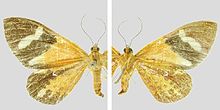| Hagnagora croceitincta | |
|---|---|

| |
| Male (dorsal view left and ventral) | |

| |
| Female (dorsal view left and ventral) | |
|
Scientific classification
| |
| Domain: | Eukaryota |
| Kingdom: | Animalia |
| Phylum: | Arthropoda |
| Class: | Insecta |
| Order: | Lepidoptera |
| Family: | Geometridae |
| Genus: | Hagnagora |
| Species: | H. croceitincta
|
| Binomial name | |
| Hagnagora croceitincta (
Dognin, 1892)
| |
| Synonyms | |
| |
Hagnagora croceitincta is a species of moth of the family Geometridae first described by Paul Dognin in 1892. It is found from central Colombia to south-eastern Peru.
The length of the forewings is about 23 mm. Adults are conspicuously coloured, with orange, dark brown and white patterns. [1]
References
-
^ Brehm, Gunnar (November 18, 2015).
"Three new species of Hagnagora Druce, 1885 (Lepidoptera, Geometridae, Larentiinae) from Ecuador and Costa Rica and a concise revision of the genus". ZooKeys (537): 131–156.
doi:
10.3897/zookeys.537.6090.
PMC
4714052.
PMID
26798242.
 This article incorporates text available under the
CC BY 3.0 license.
This article incorporates text available under the
CC BY 3.0 license.
| Hagnagora croceitincta | |
|---|---|

| |
| Male (dorsal view left and ventral) | |

| |
| Female (dorsal view left and ventral) | |
|
Scientific classification
| |
| Domain: | Eukaryota |
| Kingdom: | Animalia |
| Phylum: | Arthropoda |
| Class: | Insecta |
| Order: | Lepidoptera |
| Family: | Geometridae |
| Genus: | Hagnagora |
| Species: | H. croceitincta
|
| Binomial name | |
| Hagnagora croceitincta (
Dognin, 1892)
| |
| Synonyms | |
| |
Hagnagora croceitincta is a species of moth of the family Geometridae first described by Paul Dognin in 1892. It is found from central Colombia to south-eastern Peru.
The length of the forewings is about 23 mm. Adults are conspicuously coloured, with orange, dark brown and white patterns. [1]
References
-
^ Brehm, Gunnar (November 18, 2015).
"Three new species of Hagnagora Druce, 1885 (Lepidoptera, Geometridae, Larentiinae) from Ecuador and Costa Rica and a concise revision of the genus". ZooKeys (537): 131–156.
doi:
10.3897/zookeys.537.6090.
PMC
4714052.
PMID
26798242.
 This article incorporates text available under the
CC BY 3.0 license.
This article incorporates text available under the
CC BY 3.0 license.